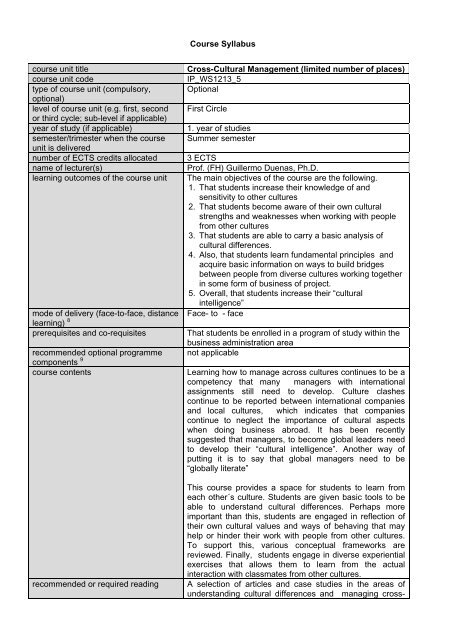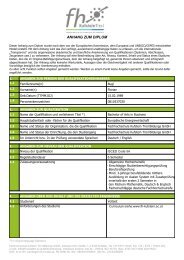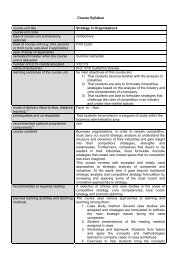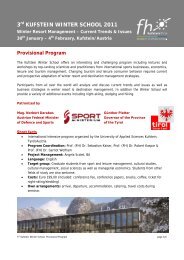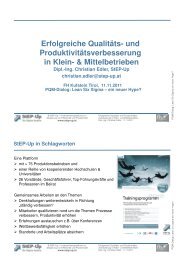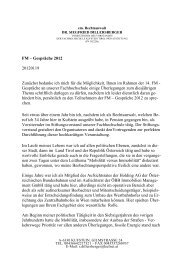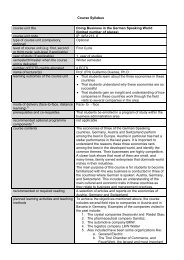Course Syllabus course unit title Cross-Cultural ... - FH Kufstein Tirol
Course Syllabus course unit title Cross-Cultural ... - FH Kufstein Tirol
Course Syllabus course unit title Cross-Cultural ... - FH Kufstein Tirol
You also want an ePaper? Increase the reach of your titles
YUMPU automatically turns print PDFs into web optimized ePapers that Google loves.
<strong>Course</strong> <strong>Syllabus</strong><br />
<strong>course</strong> <strong>unit</strong> <strong>title</strong><br />
<strong>course</strong> <strong>unit</strong> code<br />
type of <strong>course</strong> <strong>unit</strong> (compulsory,<br />
optional)<br />
level of <strong>course</strong> <strong>unit</strong> (e.g. first, second<br />
or third cycle; sub-level if applicable)<br />
year of study (if applicable)<br />
semester/trimester when the <strong>course</strong><br />
<strong>unit</strong> is delivered<br />
number of ECTS credits allocated<br />
name of lecturer(s)<br />
learning outcomes of the <strong>course</strong> <strong>unit</strong><br />
mode of delivery (face-to-face, distance<br />
learning) 8<br />
prerequisites and co-requisites<br />
recommended optional programme<br />
components 9<br />
<strong>course</strong> contents<br />
recommended or required reading<br />
<strong>Cross</strong>-<strong>Cultural</strong> Management (limited number of places)<br />
IP_WS1213_5<br />
Optional<br />
First Circle<br />
1. year of studies<br />
Summer semester<br />
3 ECTS<br />
Prof. (<strong>FH</strong>) Guillermo Duenas, Ph.D.<br />
The main objectives of the <strong>course</strong> are the following.<br />
1. That students increase their knowledge of and<br />
sensitivity to other cultures<br />
2. That students become aware of their own cultural<br />
strengths and weaknesses when working with people<br />
from other cultures<br />
3. That students are able to carry a basic analysis of<br />
cultural differences.<br />
4. Also, that students learn fundamental principles and<br />
acquire basic information on ways to build bridges<br />
between people from diverse cultures working together<br />
in some form of business of project.<br />
5. Overall, that students increase their “cultural<br />
intelligence”<br />
Face- to - face<br />
That students be enrolled in a program of study within the<br />
business administration area<br />
not applicable<br />
Learning how to manage across cultures continues to be a<br />
competency that many managers with international<br />
assignments still need to develop. Culture clashes<br />
continue to be reported between international companies<br />
and local cultures, which indicates that companies<br />
continue to neglect the importance of cultural aspects<br />
when doing business abroad. It has been recently<br />
suggested that managers, to become global leaders need<br />
to develop their “cultural intelligence”. Another way of<br />
putting it is to say that global managers need to be<br />
“globally literate”<br />
This <strong>course</strong> provides a space for students to learn from<br />
each other´s culture. Students are given basic tools to be<br />
able to understand cultural differences. Perhaps more<br />
important than this, students are engaged in reflection of<br />
their own cultural values and ways of behaving that may<br />
help or hinder their work with people from other cultures.<br />
To support this, various conceptual frameworks are<br />
reviewed. Finally, students engage in diverse experiential<br />
exercises that allows them to learn from the actual<br />
interaction with classmates from other cultures.<br />
A selection of articles and case studies in the areas of<br />
understanding cultural differences and managing cross-
planned learning activities and teaching<br />
methods<br />
assessment methods and criteria<br />
language of instruction.<br />
work placement(s) 10<br />
8<br />
9<br />
10<br />
Indicate whether the <strong>course</strong> is delivered face-to-face or through distance learning (or a combination of both)<br />
cultural situations<br />
The <strong>course</strong> combines various learning/teaching methods.<br />
1. Lecturing by professor<br />
2. Student presentations,<br />
3. <strong>Cross</strong>-cultural exercises,<br />
4. Role-plays,<br />
5. Analysis of cross-cultural incidents and cases<br />
6. Use of instruments to gain understanding of one´s own<br />
and others´ cultural patterns of behaviour, values and<br />
assumptions.<br />
The final paper consists in carrying out a cultural analysis<br />
of the countries involved in a cross-border business project<br />
or venture . Also students must propose a strategy to<br />
facilitate the cross-cultural collaboration of the various<br />
parties involved in the project or venture. Students choose<br />
the project or joint venture, whether real or hypothetical.<br />
English<br />
not applicable<br />
Indicate any <strong>course</strong>s (programme components) that are recommended to students beyond their compulsory curriculum to allow them to<br />
complement their study programme<br />
Indicate if the <strong>course</strong> consists of / contains a compulsory or optional work placement


